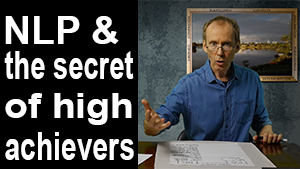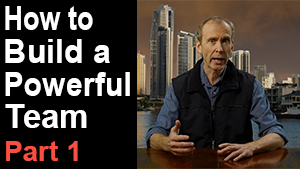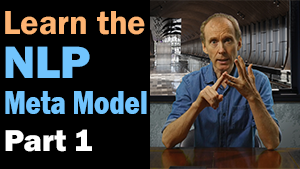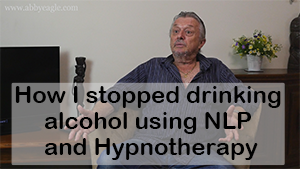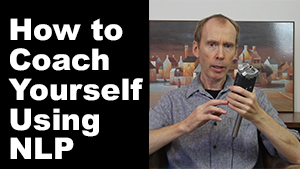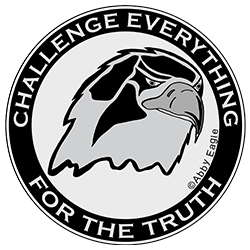
Learn how to master your mind, design your destiny - and bring about positive change in the world... Phone 07 5562 5718 or send an email to book a free 20 minute telephone or Skype session with Abby Eagle. NLP Coaching, Hypnotherapy and Meditation. Gold Coast, Robina, Australia. Online NLP Coaching sessions on Skype and by phone also available.
How to Master Your Mind and Design Your Destiny With NLP
He who sets the frame controls the game.

Why do you think and act the way that you do?
(Abby Eagle) Why do you think and act the way that you do? Is that from choice or because that is the way that you were brought up? Who set the highest frames of your mind? Attitudes, values, beliefs and behaviours that you take for granted - where did they originate from? Are you in charge of your life or does someone else run your brain for you?
Michael Hall (Neuro Semantics) coined the term, ''Frames by implication", otherwise known as an FBI. What is an FBI? An FBI is a thought in the back of your mind that determines how you should think and behave in a particular context.
For example, how you treat a small child, a sibling, a parent, a relative, an elderly person, a taxi driver, a priest, a doctor, a sales person is determined by a frame of mind that you hold about people who fit into these categories. Likewise there is frame of mind that determines how to behave in a shopping mall, church, temple, mosque, restaurant, at the beach, driving a car, walking on a footpath, riding on a bus, talking to an audience, sitting in an audience and so on.
How does the context set a frame for how you should think, feel and behave? In every context, at some level we ask ourselves questions like, "How should I behave in this situation? What can I do? What is expected of me?" How we answer these questions is determined by what we have learned from parents, teachers, religion, the media, books, films, Internet and life experiences.
But who set the frames? Was it politicians, merchants, priests, parents or someone from history? How far back can we trace the origins of our frames of mind and are these frames appropriate at this time in history? If not, then how can we go about changing the frame and at what level of mind do we need to bring about change?
Do you dress the way that you do because you choose to dress that way or does the context tell you how to dress?
To be a member of the traditional corporate culture in the West, men not only are expected to wear a suit and tie but they need to if they wish to be accepted into and work within that culture. Yet with the rise of Internet commerce we got a new culture who had no interest in conforming to the traditional norm but instead chose to dress in a more casual manner.
For example, Google has a laid-back corporate culture. They not only set a casual dress code but have created a work environment with slides instead of stairs, massage chairs and a gym. Values important to them are creativity, individuality, team work, playfulness, fun and health.
Some of us may remember a time when doctors dressed in a lab coat with a stethoscope hung around the neck but in recent years that look has been discarded for jeans and t-shirt. There was a time when Catholic nuns dressed in a traditional habit but now they blend into the community. And as the years go by the staff at my local Bank seem to have an increasingly number of casual dress days. What we see is a greater freedom to choose how to live your life.
So how did the change occur? Who decided that it was time to change the dress code? Was the decision made at the top or was it individuals who expressed their opinion to management? That is, did the doctors, nuns and Bank staff just decide to throw away the traditional garb or did someone in authority make that decision for them, and why?
The original punk dress style was an expression of a disenfranchised youth yet within a decade the style had been absorbed by the fashion industry. Likewise the tattered denim jeans and t-shirt of the working classes became the grunge style of the affluent middle classes. The meaning given to tattered jeans changed and became a way for the affluent middle classes to play act - like cosplay. Both the punk and working class dress styles were appropriated by the fashion industry. Changes which occurred at the level of a sub group became embraced by the larger society.
Even when change occurs within a governing body it is always as a result of some individual or group of individuals who inspired others to change. Some people resist change yet some welcome change. In every instance of change some people will lose while others will gain. In some cases an extremist minority may resort to litigation or violence to maintain their power structure.
But remember he who sets the highest frame controls the game. So are you happy just being a player or would you like to have some say in how the game is played - or perhaps even stop playing the old game altogether and start a new one?
How to recognise a frame of mind and get into the drivers seat?
The frame of mind is the process not the content - it is like a picture frame that frames some content. If you don't like the content try changing the frame and see if it changes the way that you think, feel and behave? In the context of this article a frame of mind could be an attitude, value, belief, memory, decision, metaphor, presupposition, a goal, even the tonality of your self talk.
Values as frames of mind.
A value is something that is important to you, for example like health, family, being right, peace, harmony, kindness, helping others, achievement, morality, money, etc. Values are arranged in a hierarchy with the highest one's taking precedence over the lower one's. Every decision that you make is based upon a value - they give you something to move away-from and something to move towards. Values are not cast in stone; if they don't serve you then they can be changed.
Beliefs as frames of mind.
A belief is the mental acceptance of the truth, actuality or validity of something. Beliefs are just a thought, a mental acceptance that you have applied to another thought in your mind. Thoughts in and of themselves are just thoughts - it is not until we give the thought some degree of importance does it become a belief. Given enough meaning a belief can become a conviction but this does not make it a fact.
Behind every conviction you will always find some doubt - that is just the nature of mind. When a belief is challenged some people get angry and become violent in an attempt to silence the one who dared speak a different truth. At a higher frame of mind there has to be another belief which holds this in place like, "I speak the truth, I am right, I am never wrong, this is the word of God, it is written in the scripture."
A belief may be maintained in the face of sensory based evidence. For example, Monsanto and the GMO groups hold the frame that genetically modified organisms are fundamentally safe and that there is no difference between them and what occurs in nature. To label a product as being free from GMO would presuppose that GMO may have adverse affects, therefor Monsanto aggressively resists efforts by consumer groups to label GMO ingredients.
Memories as frames of mind.
Memories may form referent experiences for our current way of thinking but even though life experience forms the basis for who we are, it does not make us who we are. For example, just because parents use drugs does not mean the children will use drugs when they grow up. The author had a conversation with a 20 year old man who had been brought up by a drug using father in Sydney's Kings Cross district. Rather than identifying with the parent the boy decided that drugs created too much trouble and pain. He therefor made the decision at an early age to steer clear of drugs and alcohol.
Decisions as frames of mind.
Every decision you make creates a frame of mind that will operate in the relevant context. Decisions can operate like a post hypnotic suggestion. For example John might think, "If I hear that dog bark again then I will shout and scream at my neighbour." So the next time he hears the dog bark he shouts just as he said he would.
Some decisions made as a child can still affect us as an adult. For example, if John came from a poor family and made decisions like, "I can't have what I want. I will never be a success. I might as well give up trying." Then as an adult he may find it difficult reaching his goals.
When you hear statements that sound like a limiting belief then ask, "When did you decide that?" This will give you the referent event. The next step is to update the decision and make a new one that will serve you. For example, "From this day forth I give myself permission to be a success in business." "From this day forth I will bring in to my life whatever I put my mind to."
Metaphors as frames of mind.
A metaphor is a figure of speech that is used to describe how something is like something else. Technically, "He is a lion.", is a metaphor. And, "He is like a lion." or, "He is as brave as a lion." is a simile. And, "The predatory behaviour of the telemarketer is much like that of a lion that is relentless in running down its prey" is an analogy but for the purposes of this article we can group them together and call them metaphors.
Metaphors invite us to think about things in a different light such that it changes what the object, event or action means to us. Change the metaphor, change the meaning, change the frame of mind, change the state and change the behaviour.
In April 1994 the Hutu regime conspired to murder the entire Tutsis population of Rwanda. One radio announcer on 'hate radio' who helped coordinate the genocide used the metaphor, "Cut the tall trees.", as a metaphor to kill Tutsis. Tutsis were also referred to as "cockroaches". Many of the Hutu soldiers were armed with machetes so they used the term 'to chop Tutsis'. So as long as they were just chopping tall trees or chopping cockroaches they were not killing people.
Metaphors are powerful in how they frame behaviour but meaning is not inherent in an object or an event - we are the meaning makers and as such we can change the meaning and in doing so change the behaviour.
Euphemisms and other language as frames of mind.
A euphemism replaces a harsh specific term like, kill, and replaces it with a less offensive term like, take him out. A hired murderer becomes a hit-man. One country does not drop bombs on another country they just take kinetic action. People don't get blind drunk they just get wasted, plastered or blotto.
The frame of mind that we hold determines what words we use to describe an event. For example, during Cyclone Katrina, (USA 20/08/2012), the media reported that Blacks were looting stores while Whites were finding food.
Presuppositions as frames of mind.
A presupposition is a linguistic assumption in which we suppose or assume beforehand or take for granted that something is true. For example, the statement, "John Smith does not live here anymore.", presupposes two things. 1. There is someone by the name of John Smith. 2. He used to live here.
Politicians, advertisers and journalists use presuppositions to sway public opinion. For example, President Obama is quoted as saying, "We don't need military rifles on the streets of America," This statement presupposes that there are US citizens who own military rifles and that they take them on the street. But according to Mike Adams of NaturalNews.com, "We don't have military rifles on the streets of America. What we have is semi-auto, single-shot rifles in the hands of Citizens. Virtually no one has a military "assault" rifle." (Natural News)
Regards dangerous additives in consumer products and vaccines the typical comment from the food industry, medical profession and regulatory body is typically something like, "It is just a small amount." The presupposition 'just' minimises what went before it. The amount of mercury is just a small amount. The amount of radiation from Fukushima is only as much as what you get from one chest x-ray. In doing so they shift the attention away from the facts of the matter.
Situational Presuppositions / Assumptions
There is another type of presupposition which is event rather than language based. For example, we see a shabbily dressed man lying in an alley way; there is an empty bottle nearby and he smells of alcohol so we assume that he is drunk.
A speeding police car passes us on the road with flashing lights and siren. We assume that it is driven by a member of the Police Force and that the driver must be on urgent police business.
We are at a Fair Ground and we see two men dressed in SWAT type uniforms carrying military weapons. We assume they are cosplay actors.
The situation presents itself to us with some credibility. We assume the man in the alley is drunk; we assume the speeding police car is driven by a member of the police force on urgent police business; we assume the armed men are just cosplay actors. But these are all assumptions. In fact, it would require further investigation to determine the truth of the matter.
For centuries, Governments have used the tactic whereby they create a situation and then offer a solution. Hitler engineered an event on the German Polish border which gave him an excuse to invade Poland. But the presupposition that we hold now might be, "That was just Hitler, our government would not do anything like that."
And yet that is just an assumption based upon limited information. To varying degrees these type of events seem to be a daily occurrence, for example. "It is now a widely-reported fact that under the Obama administration, U.S. federal agents actively placed over 30,000 fully-functional weapons into the hands of Mexican drug gangs, then halted all surveillance and tracking activities of where those weapons were going." (NaturalNews)
When the weapons came back into the USA and were used in criminal activities the anti gun groups used this as ammunition in their campaign to disarm US citizens. So the government creates the conflict, then offers a solution - to serve an intention that suits their aims but not necessarily in the best interest of the citizen.
So rather than blindly accepting the apparent truth of a situation we need to ask ourselves, "What is not right about this picture." We need to learn how to question and challenge everything for the truth. The NLP Peace Mapping Model, NLP Meta Model, NLP Mind Lines and NLP Meta Programs gives us a way to do that.
Goals as frames of mind
Having a goal in mind will also act as a frame and influence how you think and behave. For example, the athlete who keeps in mind the thought of winning a competition is going to make dietary and lifestyle choices that support the desired outcome.
The politician who needs votes from the electorate will say and do things that get the electorate on side but once voted into office they may change their behaviour in order to please leaders of industry.
The goal posts act as a frame for what you need to do reach the desired outcome.
Submodalities as frames of mind
How you represent thoughts in the cinema of your mind is in itself a frame. In the field of NLP, distinctions within each representational system are known as submodalities. For example, when we talk to others or talk to ourself inside our mind the words can have a volume, tonality and tempo. When we think in pictures the images may be in colour, black and white, small, big, close, far, still, moving, etc. In the early days of NLP, Richard Bandler demonstrated how to elicit a set of submodalities for a positive memory and then look through the submodalities at a desired outcome. A set of submodalities or a key submodality like tonality can become a frame of mind.
In the author's experience tonality is a key distinction. What is the tone of voice that you use? When did you learn that tonality? Does it serve you or not? Read more about tonality and meaning.
Emotions and feelings as a frame of mind
Emotions and feelings not only create a state of mind, they also influence your physical health and sense of well-being.
Now that you know how to recognise a frame of mind there are a number of questions.
1. What frames do the key players in society, the corporations, medical industry, food industry, regulatory bodies, government and religion operate from?
2. What frames does the media consistently present to the public?
3. Do your current frames of mind serve you? Do they help you to master your life and design your destiny?
4. To bring about positive change in the world what frames of mind do we need to hold.
To book a NLP Coaching session please contact Abby Eagle using the contact form on this page.
Share With Friends
| DISCUSSION GROUPS | |
|---|---|
 |
|
| NLP Future Selfing | |
| NLP, Hypnotherapy & Meditation | |
| NLP Peace Mapping | |
| Facebook Discussion Group | |




